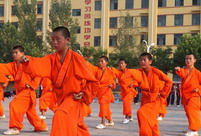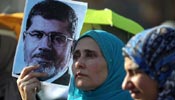 Chinese Air Force's combat group organizes actual-combat training
Chinese Air Force's combat group organizes actual-combat training Street fitness instructor
Street fitness instructor
 Couples from 56 ethnic groups create new Guinness record of proposal
Couples from 56 ethnic groups create new Guinness record of proposal
 Pakistan celebrates Independence Day
Pakistan celebrates Independence Day
 Collective wedding ceremony for 'Beijing drifters’ held in Happy Valley
Collective wedding ceremony for 'Beijing drifters’ held in Happy Valley
 An antique camera collector in Tianjin
An antique camera collector in Tianjin
 Protests held in Gaza, Jordan to support Egyptian people
Protests held in Gaza, Jordan to support Egyptian people
 China Beijing Int'l Gifts, Premium&Houseware Exhibition opens
China Beijing Int'l Gifts, Premium&Houseware Exhibition opens
 Joey Yung's new album cover released
Joey Yung's new album cover released
On the same day, Shanghai's Songhu Battle Memorial Hall received more than 1,000 visitors.
"Japanese invaders perpetrated atrocities in China in the past, but now some Japanese still visit the controversial Yasukuni Shrine. Why are some Japanese are so forgetful?" said a memorial hall visitor surnamed He.
The Battle of Songhu, also known as the Battle of Shanghai, occurred on Aug. 13, 1937. It was one of the largest and bloodiest battles during China's war against Japanese invaders.
Although Japanese Prime Minister Shinzo Abe did not visit the Yasukuni Shrine on Thursday, he reportedly offered a monetary sacrifice to the shrine, which honors 2.5 million Japanese war dead, including 14 Class-A war criminals.
For neighboring countries like China and South Korea, the shrine is a symbol of Japan's past militarism and a place that is reminiscent of the wartime atrocities committed by Japan.
"Abe and other Japanese politicians' behavior has exposed the true aim of the Japanese government. There is rising Japanese right-wing conservatism and further development of militarism," said Liu Huanxin, the president of an association that helps those who were captured or enslaved by the Japanese during World War II, as well as their children, to obtain compensation from the Japanese government.
Statistics indicate that from 1931 to 1945, nearly 40,000 Chinese laborers were enslaved in Japan, among whom more than 7,000 died.
"Abe's attitude has revealed his position. This has hurt the sensibilities of the Chinese, as well as other victims of Japan. Peaceful forces in Japan have condemned his behavior," said Wang Shaopu, a Shanghai-based researcher focusing on Asian-Pacific politics and economics.
Although Abe has claimed to have improved Japan-China relations, his actions have not matched his words, Wang said.
"According to reports from Japanese media, more people have visited the shrine this year than in previous years," said Chen Gang, a Chinese who lives and works in Tokyo.
Chen said a series of World War II-centric TV programs broadcast by Nippon Hoso Kyokai (NHK), Japan's public broadcaster, largely ignore the damage done by Japanese forces.
"They highlight the 'heroism' of the Japanese military and do not feature very much introspection," Chen said.
Chinese Foreign Ministry spokesman Hong Lei said Thursday that Japanese cabinet members' visits to the Yasukuni Shrine represent an open challenge to historical justice and the human conscience.
"The attitudes of those in power in Japan toward historical issues, including those concerning the shrine, concern the political foundation of China-Japan relations," Hong said.
Their visits represent an attempt to glorify militarism, deny past aggression and challenge the results of World War II and post-war international order, Hong said.
He urged Japanese leaders to deliver on their commitment to deeply reflect on their history and make real efforts to gain trust from the international community.
"Otherwise, Japan's relations with its neighbors will have no future," Hong said.
 |
 Helicopters, tanks seen during China-Russia joint drill
Helicopters, tanks seen during China-Russia joint drill Conjoined twins separated in groundbreaking surgery
Conjoined twins separated in groundbreaking surgery Summer photos of Zhang Xinyi, how graceful
Summer photos of Zhang Xinyi, how graceful  Pakistan celebrates Independence Day
Pakistan celebrates Independence Day Beijing Int'l Gifts, Premium & Houseware Exhibition opens
Beijing Int'l Gifts, Premium & Houseware Exhibition opens Kung Fu soccer team trains at Songshan Shaolin training base
Kung Fu soccer team trains at Songshan Shaolin training base  Air Force's combat group conducts flight training in joint drills
Air Force's combat group conducts flight training in joint drills Protests held in Gaza, Jordan to support Egyptian people
Protests held in Gaza, Jordan to support Egyptian people Various sun protective outfits
Various sun protective outfits Jaguar Land Rover to recall 11,852 cars
Jaguar Land Rover to recall 11,852 cars In sports arena, you are my greatest rival!
In sports arena, you are my greatest rival! Top 10 fatal vipers on earth
Top 10 fatal vipers on earth Day|Week|Month